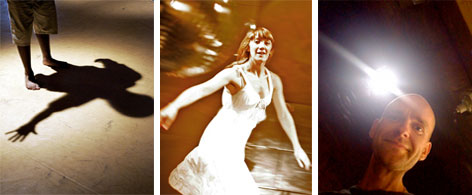University of Brighton's new artist in residence, David Harradine, explores climate change
15 Aug 2013

An artist in residence has been appointed at the University of Brighton to make films using dancing bodies under stress as a metaphor for the environmental stress caused by a changing climate.
Each film will depict a human or animal body dancing in a different landscape and will be created for screening at film festivals, online, and public places.
The aim is to explore how climate change can be made more meaningful, by questioning the separation of humans from animals, and culture from nature, that currently characterise popular representations of the environment and climate change.
The artist is London-based David Harradine, artistic director of Fevered Sleep, whose project An Infinite Line: Brighton was in the Brighton Festival in 2008 (www.feveredsleep.co.uk).
His appointment has been made possible by a £12,000 grant from the Leverhulme Trust, which supports research and education.
David will work with Dr Julie Doyle, Principal Lecturer in Media Studies in the Faculty of Arts to explore how climate change can be embodied and visualised through film. This collaboration allows for academic approaches to the environment to be interrogated through the practice of art.

Julie, currently writing a book on climate change communication, said: "This residency is significant because it recognises the importance of cross-disciplinary work on climate change communication, and the rich connections between academic and artistic practices.
As a media academic who examines the cultural representations of climate change, the opportunity to work with an artist of David's calibre is an exciting prospect, and I am looking forward to exploring how imagery can be better used to engage people with the issue of climate change."
David said, "I'm really thrilled to have been offered this residency. It will allow me to work in a stimulating and challenging environment and I'm looking forward to working closely with an expert from a field very different from my own.
I really believe that complex, cross-disciplinary conversations around climate change are a necessary part of the struggle to find a language and an imagery to communicate such an urgent theme."
David’s residency starts in October 2009 and lasts for nine months.